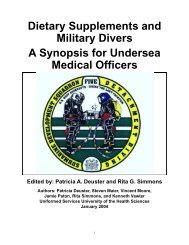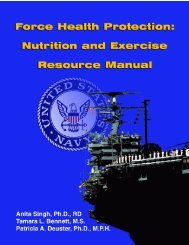Traumatic Brain Injury and Effects of Altitude - Human Performance ...
Traumatic Brain Injury and Effects of Altitude - Human Performance ...
Traumatic Brain Injury and Effects of Altitude - Human Performance ...
You also want an ePaper? Increase the reach of your titles
YUMPU automatically turns print PDFs into web optimized ePapers that Google loves.
<strong>Traumatic</strong> <strong>Brain</strong> <strong>Injury</strong> (TBI) <strong>and</strong> <strong>Effects</strong> <strong>of</strong> <strong>Altitude</strong>:An Analysis <strong>of</strong> the Literatureimportance <strong>of</strong> temperature assessment <strong>and</strong> stabilization in the pre-hospital setting, especially in militaryoperational settings where casualties may be exposed to extreme hot or cold temperatures <strong>and</strong>/or highlevels <strong>of</strong> physical activity for prolonged periods <strong>of</strong> time.RESEARCH CONSIDERATIONSBased on this review, several key knowledge gap areas are apparent. First <strong>and</strong> foremost, there is apressing need for additional clinical studies <strong>and</strong>/or case reports <strong>of</strong> military aeromedical evacuation <strong>and</strong>transport involving TBI casualties. This work is needed to inform the development <strong>of</strong> risk <strong>and</strong> injurypr<strong>of</strong>iles <strong>and</strong> protocols which address timing <strong>and</strong> interventions needed to prevent adverse outcomesfrom exposure to altitude-related factors, as well as secondary brain injury events. Goodman et al.(2009) have specified the need for studies to delineate the course <strong>of</strong> neuro-inflammation during airtransport. Such research may help to identify an “ideal time to fly” so as to avoid exacerbation <strong>of</strong> post-TBI secondary injury (neuro-inflammatory) events.This review focused on moderate-to-severe TBI patients; none <strong>of</strong> the studies we identified through thisreview included mTBI patient cohorts for comparison. This is underst<strong>and</strong>able, given that the majority <strong>of</strong>mTBI patients recover well over a period <strong>of</strong> weeks or months without hospitalization. However, itbecomes more difficult to identify severity-related differences across studies that do not wholly addressthe full spectrum <strong>of</strong> injuries <strong>and</strong> impact. Observed relationships between severity <strong>and</strong> altitude-relatedfactors were few (Davis et al., 2005; Diringer et al., 2004; Maggiore et al., 2009; Manley et al., 2001).Military conflicts in high-altitude <strong>and</strong> mountainous terrain underscore the need for renewed emphasisto determine what if any health risks or performance effects might occur in military personnel whorecover from mTBI, concussion, or multiple concussions <strong>and</strong> then return to duty at high altitudes.Though recovery from mild head injury is common, mTBI can involve cerebral tissue damage resulting innerve axon degeneration, neurotransmission impairment, <strong>and</strong> the loss <strong>of</strong> neural connections (Povlishocket al., 1992; Raghupathi et al., 2002; Smith et al., 2003; Iverson, 2005; Kraus et al., 2007). Quantitatively,the severity <strong>of</strong> such damage can be conceived as “proportional to the numbers <strong>of</strong> dead <strong>and</strong> damagedneurons, their relative functional importance, <strong>and</strong> their capacity for self-repair” (Gualtieri, 1995). It isreasonable, then, to consider that mTBI also may be adversely affected by exposure to altitude-relatedsecondary injury processes. Most military TBIs are closed-head injuries due to blast or explosion <strong>and</strong> areclassified as mTBI (Warden, 2006; Galarneau et al., 2008). Many military personnel who sustain mTBI orconcussion will recover <strong>and</strong> return to duty. Lew et al. (2007) present an informative review <strong>of</strong> postconcussionreturn-to-action criteria based on research <strong>and</strong> experience from within the field <strong>of</strong> sportsmedicine. However, little research has addressed the question <strong>of</strong> lingering, subclinical functionalimpairments since the early work <strong>of</strong> Ewing, et.al. (1980). Military conflicts in high-altitude <strong>and</strong>mountainous terrain underscore the need for renewed emphasis to determine what if any health risksor performance effects might occur in military personnel who recover from mTBI, concussion or multipleconcussions <strong>and</strong> then return to duty at high altitudes.Finally, research is needed to investigate the prophylactic <strong>and</strong>/or therapeutic effects <strong>of</strong> drug therapiescommonly used to treat altitude-related illness, to determine their potential efficacy in preventingaltitude-related illness or injury in TBI casualties. To the extent that such medications improveoxygenation or reduce inflammatory responses, they may also be helpful to prevent or mitigatesecondary brain injury generally. Likewise, it is important to identify any such formulations that may beSeptember 14, 2010 26



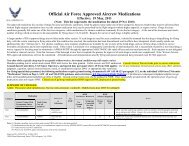
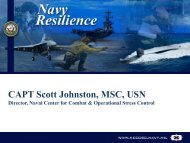
![Body Composition and Military [PDF] - Human Performance ...](https://img.yumpu.com/43269347/1/190x245/body-composition-and-military-pdf-human-performance-.jpg?quality=85)
![Tips for Grocery Shopping [PDF]](https://img.yumpu.com/37447379/1/190x245/tips-for-grocery-shopping-pdf.jpg?quality=85)
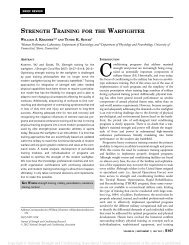
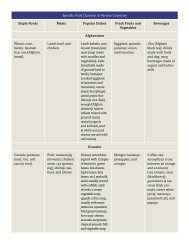
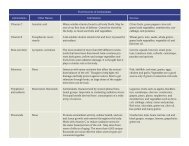
![Synthetic Drugs [PDF] - Human Performance Resource Center](https://img.yumpu.com/37447322/1/190x245/synthetic-drugs-pdf-human-performance-resource-center.jpg?quality=85)
